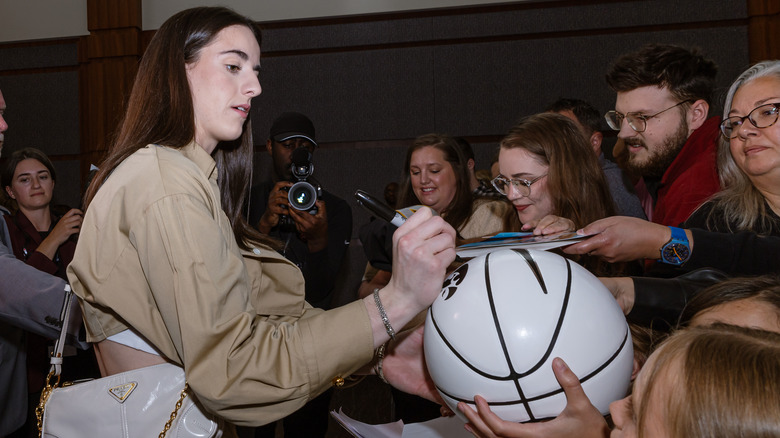Microfeminism Is Going Viral On TikTok, But It's More Than Just A Trend
Contrary to how our culture has evolved regarding gender equality in 2024, there are still plenty of cis men still living in the dark ages. Men traditionally interrupt or talk over women (manterruptions) — both in professional and social settings — they take credit for things that women have developed, and still police our workplace communication. Outside the office, men are just as guilty of practicing misogynistic behavior. If you've ever walked down a sidewalk with a group of men coming in your direction, you've probably noticed that not only do they NOT yield, but they tend to plow through you and force you off the sidewalk.
These aren't one-off situations. These are things that, if you were to gather hundreds of women into a room and take a quick survey, you'd find that most, if not all of them have had to deal with this type of behavior. It's these actions and attitudes that have given rise to something called microfeminism. "While feminism incorporates large-scale advocacy, protests, and systemic changes, microfeminism focuses on subtle, daily actions that challenge patriarchal norms and provide women with meaningful, personal support," therapist Sophie Cress told Yahoo.
But while microfeminism may be trending at the moment (and hopefully will for a long time), it's not without its issues. Feminism itself can be problematic, both in its execution and the way it alienates people. Naturally, the micro-sized version is far from perfect too.
How microfeminism impacts our culture
If you think about microfeminism on a bigger scale, then you can see how each microfeminist act is making a change in a gradual, non-aggressive way. Feminism, especially in circles of those who don't understand it, tends to get a bad reputation for being loud and in your face, but when we micro-size this energy and intention, it's like sneaking one past the goalie.
"There is still a huge gender disparity in the workplace," host of People Managing People podcast David Rice told Personnel Today. "Without businesses owning up to these huge discrepancies, we still don't know the full face of the problem. These micro-feminism tactics highlight why DEI programs are so important." With enough microfeminist acts being regularly used in positive and progressive ways, we may see an even bigger change more quickly. Maybe next year we won't have to collectively gasp in disgust over WNBA-related salary news because we'll finally, as a culture, be on the right track.
What you can do to get in on the microfeminism trend
The easiest way to incorporate microfeminism into your day is by flipping gender norms on their heads. For example, if you're addressing an opposite-sex couple in a document, put the woman's name first. During work meetings, ask men to take notes and put them in charge of the tasks that would have traditionally gone to a secretary. Even just interrupting a man who's interrupted a woman, telling him she currently has the floor, and giving her space to be heard is deeply important. It shows women that you've got their backs and, hopefully, the man in question will realize his error in being so blatantly rude. Think of it as subtly helping (read: reprogramming) these men, because no one ever told them that their gender does not lend credence to importance.
"The women that have come before us have done so much, but we're still fighting for legal equality in removing discriminatory laws, reproductive rights, workplace rights, sexual liberation, and individual autonomy," corporate lawyer and TikToker Katie Wood told Glamour. "Some women don't want to (or can't) join protests, or share on their social media, or vote ... so microfeminisms are little things that those people can do that can move the needle, if even by a little."
But microfeminism isn't without its issues
While Wood has some great approaches and ideas for practicing microfeminism, things get a little murky when it comes to pronouns. For example, Wood referring to all upper-level management as "she," if she (Wood) doesn't know what their gender actually is, can seem impactful and even be so in some situations, but we're living in a world where there aren't just two pronouns. This isn't nit-picking, but fact. No one should be misgendered, even if it's in the name of feminism, because then it just makes that feminism for only one type of person.
Wood also says that, for her, these acts are meant to "p*ss off men," which is not the point, or even the hope of feminism — it never was. Granted, it certainly doesn't take much to upset a certain brand of man, but Wood might be giving them too much credit by suggesting that the men in question are even aware of what just happened. So using this as a reason behind microfeminism isn't exactly the best angle.
Although microfeminism is getting a lot of attention right now thanks to TikTok, we don't have to make this a short-lived trend. As Wood pointed out to Glamour, "Women are saying they've been doing these things for 40 years," so why not make it another 40, 50, or a regular thing forever? If done correctly while being cognizant of the nuances involved, microfeminism can be a stealthy little weapon against the patriarchy.



